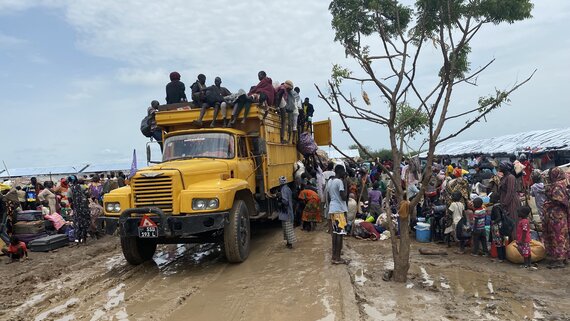"Conditions here cannot be worse than what we experienced when fleeing."
- 13 year old girl arriving from Sudan
On 15 April 2023, conflict broke out between the Government of Sudan Armed Forces (SAF) and the Rapid Support Forces (RSF), an opposition militia group. Before the conflict, Sudan hosted some 1.1 million refugees and asylum-seekers, of whom 800,000 were registered South Sudanese nationals. Furthermore, many South Sudanese resided in Sudan and had not sought international protection. As of the beginning of November of 2023, nearly 400,000 returnees had arrived South Sudan, with a further 420,000 anticipated in 2024.
People forced to flee Sudan face multiple protection risks during their flight as they seek safe pathways into South Sudan. Most people forced to flee have endured long, arduous journeys. Many are traumatized by the live experience of violence against civilians, and many – particularly women and girls have experienced or witnessed various forms of GBV. Onward transportation assistance remains a crucial priority in the returnee response. High arrival rates combined with existing limited transportation infrastructure and insufficient capacities of resident communities in border areas require increased support in onward transportation to prevent congestion in border areas and transit centers. Upon arrival, returnees need immediate life-saving assistance, including food, WASH, vulnerability and health screening, shelter, vaccinations for children, and psychosocial support.
"I never thought I would be so happy to see my own town again, but here I am, smiling from ear to ear."
- 19 Year old Boy, Manga Port, Unity State
Furthermore, many returnees arrive malnourished and in poor health and physical conditions. The inability to meet basic needs and food insecurity among new arrivals is anticipated to increase as returnees are forced to flee with few resources and arrive in areas with few resources or immediate livelihood opportunities. Due to disease outbreaks in Sudan, additional risks persist upon arrival, requiring proactive mitigation measures and preparedness.
The Sudan crisis adds more needs to the already dire humanitarian situation in South Sudan, requiring additional response capacity. People are arriving in areas of destinations that already have huge deficits of services, and the coping capacities of communities have already been eroded. In addition, the conflict has heavily impacted markets in states bordering Sudan, leading to rapid prices of essential commodities, including food.

Rent County, Upper Nile State
A truck departs with returnees from Renk transit center, Upper Nile State to final places of destination across the country. Thousands of people fleeing violence in Sudan into South Sudan waits for onward transportation at Renk transit center.
OCHA/Wilfred Iramaku Vundru"Even with everything going on, being back in my own country feels like a weight has been lifted off my shoulders."
- Father of 4 boys and 2 girls, Unity State
Returnees require responsive onward transportation support to ensure that their journey, transition, and integration into their communities or final destinations of choice are quickly met to decongest border areas and reduce pressure on limited facilities in transit and border areas. Challenges with onward transportation from the border areas are expected to continue, prolonging the stay of returnees in transit, increasing protection and health risks and food, nutrition, WASH, shelter, and other needs. There will be a need to continue working closely with the authorities to facilitate people’s onward movement from border crossing points to transit locations and onwards to final destinations by riverine, air, road, or a combination of modes of transport. While onward transport to final destinations is a priority, intermittent stoppages are expected due to security concerns, weather conditions, and availability of transport with estimated transit time at each location longer than a week. Considering the projected increased number of people arriving from Sudan and the prolonged transit period, existing transit centers must be maintained or expanded. Many services provided upon arrival for the most vulnerable returnees will need to be sustained, including specialized child protection services, responses to GBV, mental health and psychosocial support, and support for the elderly. Food and nutrition will remain a priority.
"We only need help for a time to get set up, and then we can manage ourselves."
- 72 year old grandmother guiding her family, Bulakat centre for arrivals from Sudan, Malakal

